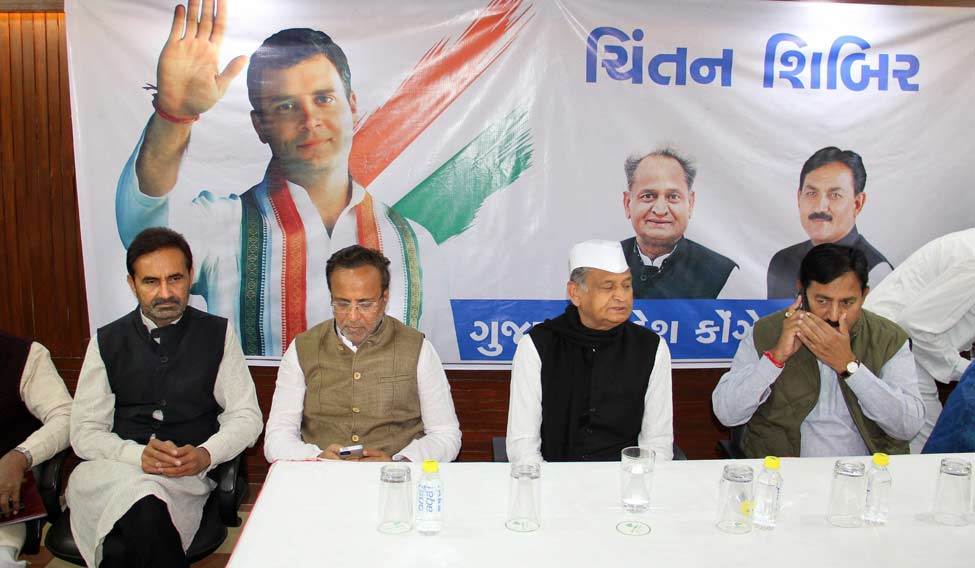Prime Minister Narendra Modi's hard-fought win in his home state of Gujarat for the sixth consecutive time is indicative of his popularity taking a hit in the rural areas. He has been candid in acknowledging that the ruling BJP won the trust of only half the state this time.
Is this an indication that Modi's honeymoon with the people at large and particularly in Gujarat has taken a hit? At least in the last three decades, a prime minister's popularity with the masses starts dipping after completing 36 to 42 months in office.
While the saffron brigade enjoyed wide support in the urban areas, there was an unmistakable tilt in favour of the Congress party in the rural areas which was not enough to dislodge the saffron brigade having ruled Gujarat on the trot for 22 years.
At the same time, the Congress managed to increase its tally in the state assembly by 16 seats leading to subdued cheer in the grand old party. It had also played an effective part in ensuring that the BJP was nowhere near achieving its over ambitious target of 150 seats in the 182-member state assembly.
The anti-incumbency against the BJP cannot be wished away. This has provided much food for thought to the Lotus party to do a reality check as Modi told his party MPs on Wednesday that the win in Gujarat was not easy by any means.
Efforts by the Congress to build caste and social alliances proved effective in the BJP's citadel. The Patidar Anamat Andolan Samiti gave the Congress a shot in the arm in the Saurashtra-Kutch region.
Simultaneously, backward classes leader Alpesh Thakor and Jignesh Mewani who organised dalits against attacks by Hindutva vigilantes facilitated the Congress gaining support from a wider social base. Both have entered the state assembly and assured their followers of taking up their cause.
The BJP's best in Gujarat has been 127 seats so far. Since then it has had to remain satisfied with a reduced tally. Five years back in 2012, it was 115 and this time it finished with 99 seats, one short of the three figure mark of 100.
A shade over-three-and-a-half years after Modi became the Prime Minister in May 2014, the chinks in his armour are being exposed along with the widening cracks in his much touted Gujarat model of development. The growing discontent among the people in that state has raised the hopes of a Congress revival.
The BJP triumph in Himachal Pradesh propelled it to regain power in the hill state. However, BJP's chief ministerial candidate Prem Kumar Dhumal losing to his Congress rival proved to be a dampener even though the party won nearly two-thirds of the seats in the 68-member assembly.
At the same time, Gujarat watchers believe the competition in that state has woken up the Congress to posing a greater challenge to the BJP in the nine states going to the polls next year including Karnataka, Madhya pradesh, Rajasthan and Chattisgarh.
While the Congress has strong leaders in some of these states like Karnataka, Madhya Pradesh and Rajasthan, Modi's advantage might be far less in these states compared to Gujarat. The odds seemed stacked against the Lotus party this time due to resentment on a host of issues including demonetisation, GST, growing unemployment and distress faced by the farmers all over the country.
There is no doubt Modi remains the trump card for his party. He has described it as a win for the overarching theme of "vikas" or development. It is time for the ruling party in Gandhinagar to address the growing unease among the people in the state.
What has stood out is that the voters cannot be taken for granted. While the number of BJP ruled states in the country has jumped to 19 with the India map being swathed in Saffron, the writ of the Congress party runs only in Karnataka and Punjab.
The Congress came a cropper in Himachal Pradesh as the old war horse Virbhadra Singh got little support from the party headquarters in the national capital. He had to contend with rebel candidates who cut into the party votes. Making matters worse included the corruption charges against the outgoing chief minister and the mishandling of the Kotkhai rape case.
The task ahead for Rahul Gandhi having taken over the stewardship of the Congress party from his mother Sonia Gandhi last week pertains to giving a push to tolerance of dissent, pluralism and cultural diversity coupled with steering clear of any communal agenda.
He has to chart out his political and ideological agenda for strengthening the party organisation which is in a shambles. It is imperative for him to be clear about the political agendas of his opponents in the country's system. Compounding matters are more than two score affiliates of the RSS, the idealogue of the BJP.
Rahul has to tackle Modi's agenda of striving for a "Congress mukt Bharat". He also needs to encourage leaders having a mass base as evidenced in the past. It is important for him to infuse a sense of comaraderie among Congressmen to end the intense infighting and divisiveness which has been the bane of the party.
The views expressed in this article are solely those of the author and do not necessarily represent the views of the publication.





